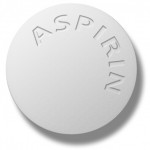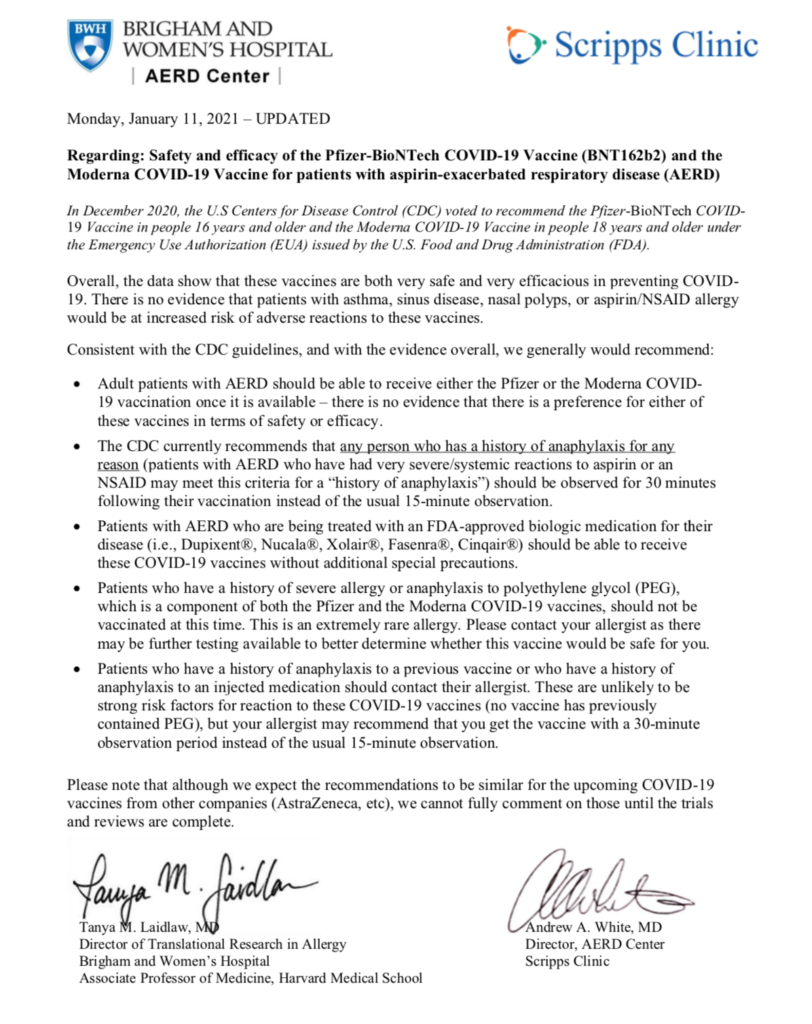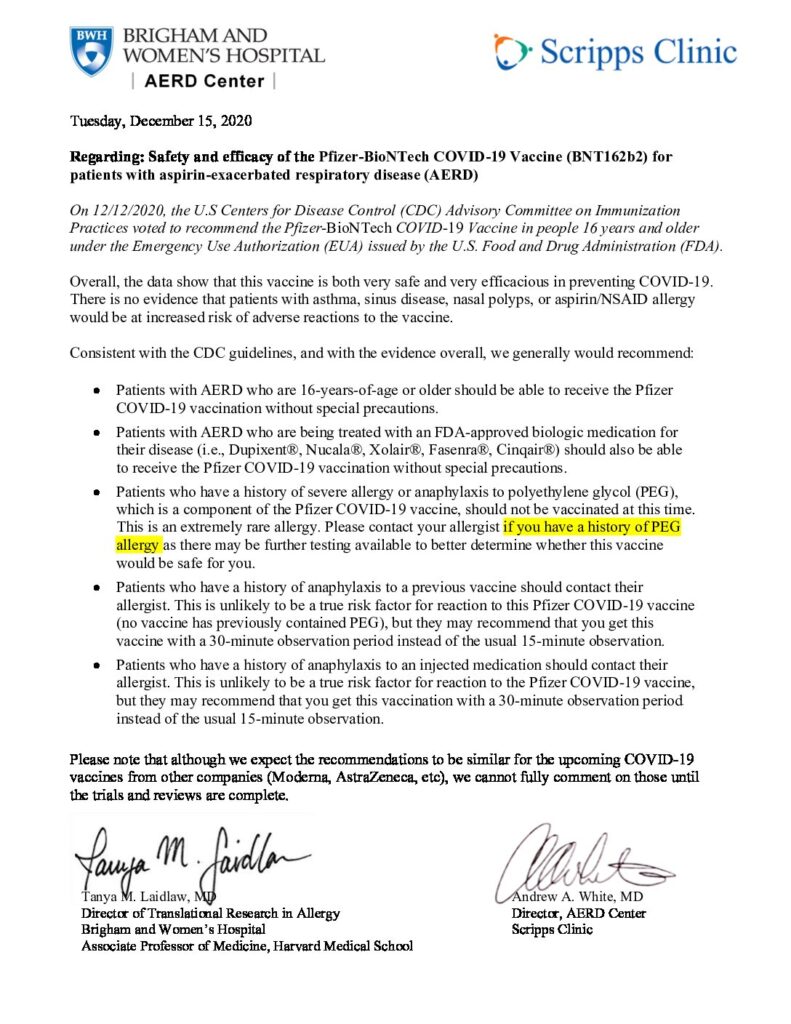What is AERD/Samter’s Triad?
 Aspirin Exacerbated Respiratory Disease (AERD), also known as Samter’s Triad or Aspirin Sensitive Asthma, is a chronic medical condition that consists of asthma, recurrent sinus disease with nasal polyps, and a sensitivity to aspirin and other non-steroidal anti-inflammatory drugs (NSAIDs). Approximately 10% of all adults with asthma and 40% of patients with asthma and nasal polyps are sensitive to aspirin and NSAIDs.
Aspirin Exacerbated Respiratory Disease (AERD), also known as Samter’s Triad or Aspirin Sensitive Asthma, is a chronic medical condition that consists of asthma, recurrent sinus disease with nasal polyps, and a sensitivity to aspirin and other non-steroidal anti-inflammatory drugs (NSAIDs). Approximately 10% of all adults with asthma and 40% of patients with asthma and nasal polyps are sensitive to aspirin and NSAIDs.
What are the symptoms?
Patients with AERD/Samter’s Triad usually have asthma, nasal congestion, and nasal polyps, and often do not respond to conventional treatments. Many have experienced chronic sinus infections and can lose their sense of smell. The characteristic feature of AERD/Samter’s Triad is that patients develop reactions triggered by aspirin or other NSAIDs.
These reactions can include:
- Increased nasal congestion or stuffiness
- Eye watering or redness
- Cough, wheezing, or chest tightness
- Frontal headache or sensation of sinus pain
- Flushing and/or a rash
- Nausea and/or abdominal cramping
- General feeling of malaise, sometimes accompanied by dizziness
If you not do have asthma, nasal congestion and/or nasal polyps but experience reactions to aspirin or NSAIDs, click here and here to learn about the Brigham and Women’s Aspirin and NSAID Allergy Clinic. The Aspirin/NSAID Allergy new patient packet can be found here.
Utilization of protocols to lower daily aspirin dose prior to surgical procedures for patients with AERD
Aspirin-lowering and ibuprofen-bridging protocols are safe and effective for patients with aspirin-exacerbated respiratory disease to decrease aspirin dosing prior to elective surgical procedures, but were only utilized in half of surveyed participants, suggesting need for increased awareness. Click here to see our BWH aspirin-lowering protocol. Read more here.
Efficacy of various dosing frequencies of dupilumab in patients with AERD
This study found that 32% of AERD patients on dupilumab for asthma or nasal polyposis had attempted a dosing interval other than every 2 weeks. Of those, 68% chose to continue with less frequent injections, most commonly every 3 weeks, without reduction in their perceived clinical benefit. Our data highlight the potential for patients with AERD to reduce their dupilumab dosing frequency in the future and the need for provider education about this option. Read more here.
Consequences of NSAID allergy on pain control options for patients with AERD
This study demonstrates that celecoxib offers effective pain management for patients with AERD, and that non-selective NSAIDs (like ibuprofen and Naprosyn) are effective and safe for most AERD patients to take after aspirin desensitization. We found that there is a high rate of narcotic overprescribing for patients with AERD, suggesting that reported NSAID allergies predispose our patients to the use of stronger and potentially less safe pain medications. Interestingly, despite multiple studies pointing to celecoxib as an appropriate option for many patients with AERD, narcotics were more often prescribed for pain in place of a non-selective NSAID than was celecoxib. Additional education of our pain-management colleagues regarding the safety and efficacy of celecoxib in patients with AERD may help avoid unnecessary opioid over prescribing. Read more here.
Validation of a questionnaire assessing smell loss in an international aspirin-exacerbated respiratory disease population
This study examined the validation of the questionnaires used for a prior study from our group that examined how loss of smell impacted the mental health and quality of life of patients with AERD. We determined that this new Consequences of Smell Loss (COSL) questionnaire can be used as a brief, valid, reliable tool that can effectively screen for a high burden of smell loss in patients with AERD and other patient populations where smell and olfaction are affected. Read more here.
Co-treatment of non-steroidal anti-inflammatory drug-exacerbated respiratory disease with dupilumab and aspirin therapy after desensitization
In this study, we evaluated 22 patients with AERD who were treated with dupilumab for 3 months, and 8 of those patients had also undergone aspirin desensitization prior to the start of dupilumab and continued on their high-dose daily aspirin throughout the study. We found that treatment with dupilumab in patients who were also on daily aspirin therapy led to a reduction in sinonasal eosinophilic inflammation. We did not see a reduction in sinonasal eosinophilic inflammation in the patients who were only on dupilumab without the additional daily aspirin therapy. Conversely, we saw that patients who were only on the dupilumab did develop a significant increase in the eosinophil levels in their blood, but for the patients who were on daily aspirin therapy and then started dupilumab treatment, there was no significant change in their blood eosinophil levels after starting dupilumab. Both daily aspirin therapy after aspirin desensitization, and dupilumab therapy, have been important treatments for patients with AERD, and further studies may be needed to fully understand how these two treatment options work together. Read more here.
Trial of thromboxane receptor inhibition with ifetroban: TP receptors regulate eicosanoid homeostasis in aspirin-exacerbated respiratory disease
This clinical trial compared one month of treatment with ifetroban (a medication that blocks the thromboxane A2 receptor) to placebo in patients with AERD, to see if the ifetroban treatment decreased the severity of aspirin-induced reactions. Unfortunately, there was a small signal that actually the treatment with ifetroban actually worsened patients’ reactions to aspirin. This was unexpected, and to further understand why, additional studies were done, that showed that ifetroban inhibited the production of prostaglandin E2 and increased the levels of cysteinyl leukotrienes, which likely explains why our patients had a negative response to it. Read more here
Pediatric-onset aspirin-exacerbated respiratory disease: Clinical characteristics, prevalence, and response to dupilumab
AERD is generally recognized as an adult-onset disease, however; the prevalence of AERD in pediatric patients is not well defined. In May 2022 we described a series of 6 pediatric patients with AERD, and their childhood AERD symptoms were almost identical to those in adults with AERD. In our AERD registry we found that more than 6% of the patients report that their AERD symptoms started before 18 years of age and noted that females tend to develop AERD earlier than males, and that developing AERD as a child is more common for girls than for boys. Additionally, all 6 adolescent patients in this series had severe enough disease symptoms that they were prescribed dupilumab as a treatment option, and all of them had good responses to dupilumab with improvements in both asthma and sinus symptoms. Therefore, we recommend that for adolescents with poorly controlled symptoms of AERD the potential benefit of treatment with dupilumab should be considered. Read more here .
Loss of smell in patients with aspirin-exacerbated respiratory disease impacts mental health and quality of life
A common problem for AERD patients is loss of sense of smell, or anosmia, but its impact on patients’ quality of life, mental health, and physical wellbeing has been poorly studied. We developed a new questionnaire about the consequences of anosmia, which, along with several other quality-of-life questionnaires was sent to all our Registry patients. Eighty-five percent of the 853 patients who answered the questionnaires (Thank you!) reported diminished sense of smell and/or taste, and we learned that their loss of smell severely impacts their physical, emotional, and mental health. Many patients with diminished smell responded that they could not identify spoiled food (86%), did not enjoy food (71%), felt unsafe (63%), and had encountered dangerous situations (51%) because of their poor smell.
We think that the importance of sense of smell and the relevance of anosmia to patients’ lives should be acknowledged and evaluated by clinicians caring for these patients. Read more here.
Rapid and sustained effect of dupilumab on clinical and mechanistic outcomes in aspirin-exacerbated respiratory disease
This study followed 22 patients with AERD who were treated with dupilumab for 3 months. Participants had rapid improvement in their symptoms, including sense of smell, sinonasal symptoms, and lung function after just 1 month of dupilumab, which were sustained after 3 months of dupilumab. Baseline severity of smell loss correlated with lower nasal prostaglandin E2 levels. Dupilumab increased nasal prostaglandin E2 and decreased levels of nasal albumin, nasal and urinary leukotriene E4, and serum and nasal IgE. Transcripts related to epithelial dysfunction and leukocyte activation and migration were downregulated in inferior turbinate tissue after treatment with dupilumab. There were no dupilumab-induced changes in markers of nasal eosinophilia. We conclude that inhibition of IL-4Ra in AERD led to rapid improvement in respiratory symptoms and smell, with a concomitant improvement in epithelial barrier function, a decrease in inflammatory eicosanoid levels, and an increase in the anti-inflammatory eicosanoid prostaglandin E2. The therapeutic effects of dupilumab are likely due to decreased IL-4Ra signaling on respiratory tissue granulocytes, epithelial cells, and B cells.
Aspirin desensitization and biologics in aspirin-exacerbated respiratory disease: Efficacy, tolerability, and patient experience
In this study we surveyed 98 patients with AERD in the Brigham and Women’s Hospital AERD registry. Patients completed an online questionnaire describing their medication history and treatment experience. A total of 52 (53.0%) patients reported a history of use of one or more respiratory biologics (omalizumab, mepolizumab, reslizumab, benralizumab, or dupilumab), and 84 (85.7%) reported undergoing aspirin desensitization. There were 24 patients (24.4%) who reported concurrent use of a biologic and daily aspirin therapy. Compared with those on daily aspirin therapy alone, patients taking a biologic and aspirin therapy concurrently were less likely to report that aspirin was effective for their AERD symptoms. Whereas patients reported varying efficacy with biologics, dupilumab had the highest odds of patients reporting it worked “very well”. We conclude that biologics are emerging as a treatment option for AERD and are generally well tolerated. Biologic efficacy in AERD is variable by agent, though most patients taking dupilumab found it to be effective. Patients on a biologic in conjunction with daily aspirin therapy may represent a more severe subset of AERD for which daily aspirin therapy alone is insufficient. Read more here.
Dupilumab as an adjunct to surgery in patients with aspirin-exacerbated respiratory disease
We report a series of eight patients with AERD who had experienced a rapid recurrence of nasal polyps after a prior endoscopic sinus surgery, and who subsequently went on to have a revision endoscopic sinus surgery with perioperative initiation of dupilumab, a monoclonal antibody targeting interleukin 4Ra. We found that dupilumab led to no or slower nasal polyp recurrence after surgery compared to the prior sinus surgery, and perioperative initiation of dupilumab therapy also improved upper airway symptoms. This study provides evidence for the use of dupilumab as an adjunct to surgery to prevent polyp regrowth for patients with AERD and insufficient response to standard-of-care therapies. Read more here.
Dupilumab-associated arthralgia in patients with aspirin-exacerbated respiratory disease: a case series
We report a series of eight patients with AERD who developed arthralgias after initiating dupilumab. We found that 8 patients out of the 160 (5%) with AERD who have been prescribed dupilumab at our center developed possible dupilumab-associated arthralgias. Of the patients who underwent extensive rheumatologic work-up, no etiology of the joint symptoms was identified. All 8 patients experienced significant improvement in upper and lower respiratory tract symptoms and ultimately decided to continue dupilumab even with the possible dupilumab-associated arthralgias. Out of the eight subjects, the arthralgias spontaneously resolved in five of the patients. The cause of the dupilumab-associated arthralgias is unknown, but one possible explanation is a Type 1 or Type 3 “escape” with inhibition of IL-4Ra. Read more here.
Mepolizumab targets multiple immune cells in aspirin-exacerbated respiratory disease
Eosinophilic asthma and nasal polyposis are hallmarks of aspirin-exacerbated respiratory disease (AERD), and IL-5 inhibition has been shown to provide therapeutic benefit. However, IL-5Rα is expressed on many cells in addition to eosinophils, and the mechanisms by which IL-5 inhibition leads to clinical benefit in eosinophilic asthma and nasal polyposis are unlikely to be due exclusively to antieosinophil effects.
COVID-19 in a series of patients with Aspirin-Exacerbated Respiratory Disease
A series of patients with AERD who developed COVID-19, including many who were treated with respiratory biologics for their baseline AERD, did not appear to experience increased morbidity compared to the general population with COVID19. This is reassuring to those with exacerbation-prone asthma and nasal polyps. It is intriguing that a strong type 2 inflammatory signal in the respiratory tract — a signal that the vast majority of patients with AERD exhibit — might actually be protective against severe COVID-19. Read more here.


